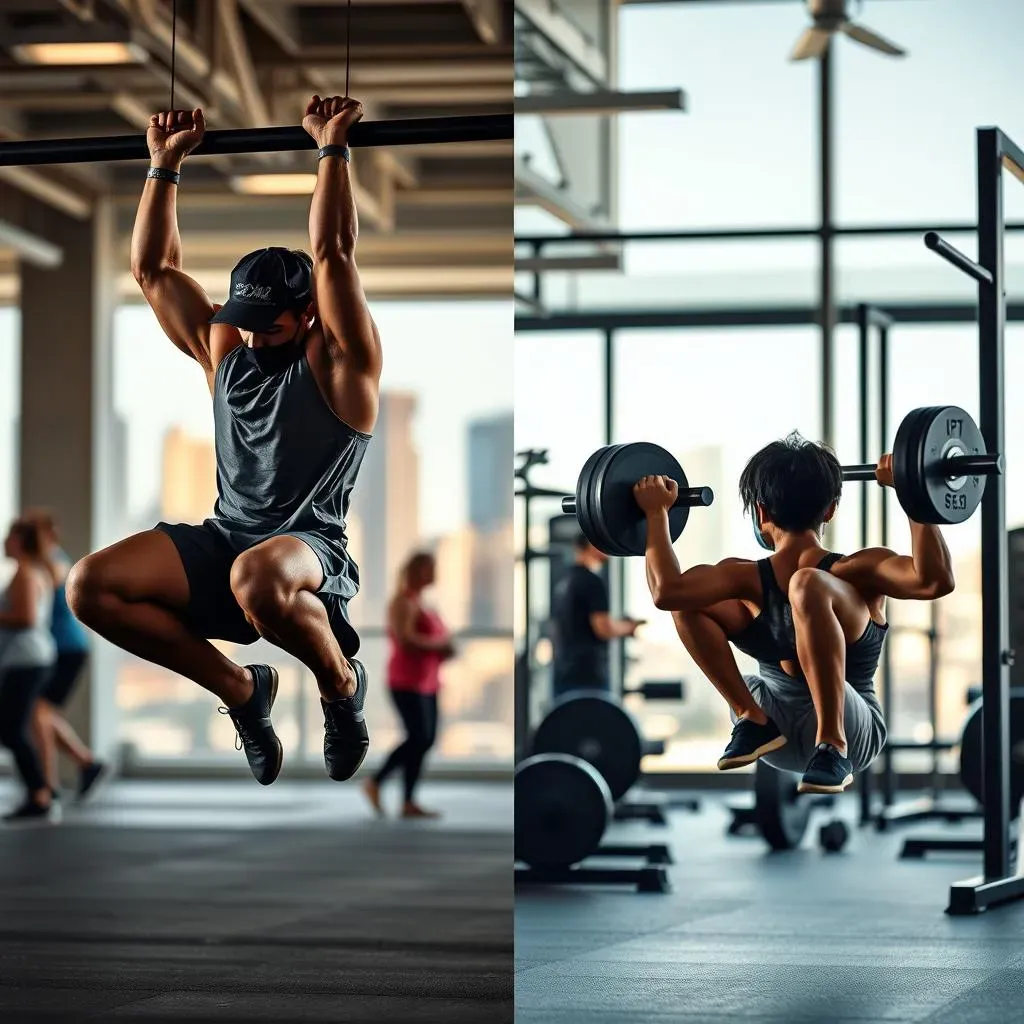Table of Contents
When it comes to strength training, two popular methods often come to mind: calisthenics and weightlifting. The question on everyone's lips is, is calisthenics better than gym? While both have their own set of benefits and drawbacks, it's essential to understand the differences between them to make an informed decision. Calisthenics uses bodyweight as resistance, offering a convenient and affordable way to exercise. On the other hand, weightlifting utilizes external weights to build strength and muscle size. But which one is more effective for weight loss, strength training, and overall fitness? In this article, we'll delve into the pros and cons of each method, exploring their effects on weight loss, strength gains, and overall fitness. We'll also discuss how combining calisthenics and weightlifting can be an effective way to achieve your fitness goals. Whether you're a seasoned athlete or just starting out, this comprehensive comparison will help you decide which path is right for you. So, let's dive in and explore the world of calisthenics and weightlifting to determine is calisthenics better than gym for your unique needs.
Calisthenics vs Gym: Understanding the Basics of Each

Calisthenics vs Gym: Understanding the Basics of Each
When it comes to strength training, two popular methods often come to mind: calisthenics and weightlifting. Calisthenics uses bodyweight as resistance, offering a convenient and affordable way to exercise. Weightlifting, on the other hand, utilizes external weights to build strength and muscle size. But what are the basics of each, and how do they differ?
Calisthenics involves exercises that work multiple muscle groups at once, such as push-ups, squats, lunges, and planks. These exercises can be modified to suit different fitness levels, making calisthenics accessible to everyone. Weightlifting, by contrast, focuses on isolating specific muscle groups using free weights or machines. This allows for more targeted strength gains, but may require more equipment and expertise.
Exercise | Calisthenics | Weightlifting |
|---|---|---|
Push-ups | Bodyweight resistance | Dumbbell press |
Squats | Bodyweight squats | Barbell squats |
Lunges | Bodyweight lunges | Dumbbell lunges |
Both calisthenics and weightlifting have their own set of benefits. Calisthenics is great for improving flexibility, balance, and coordination, while weightlifting is ideal for building raw strength and muscle mass. But which one is better for achieving overall fitness?
- Calisthenics improves functional strength, making daily activities easier
- Weightlifting increases muscle mass, which can boost metabolism
- Calisthenics enhances cardiovascular endurance
- Weightlifting improves bone density
Ultimately, the choice between calisthenics and weightlifting depends on your individual fitness goals. If you're looking for a convenient and cost-effective way to improve overall fitness, calisthenics may be the better choice. However, if you're seeking to build significant strength and muscle mass, weightlifting is likely the way to go.
Is Calisthenics Better Than Gym for Weight Loss and Strength Training?

Is Calisthenics Better Than Gym for Weight Loss and Strength Training?
When it comes to weight loss and strength training, the debate between calisthenics and gym workouts is ongoing. Calisthenics, which uses bodyweight as resistance, is often praised for its convenience and effectiveness in burning calories. Gym workouts, on the other hand, rely on weights and machines to build strength and muscle mass. But which one is better for achieving weight loss and strength training goals?
Calisthenics is particularly effective for weight loss due to its high-energy movements. Exercises like burpees, jump squats, and mountain climbers require a lot of energy, which your body gets by burning calories. This makes calisthenics an excellent way to lose weight and body fat. Additionally, calisthenics can improve cardiovascular endurance, increasing your overall fitness level.
Exercise | Calories Burned per Hour | Muscle Groups Worked |
|---|---|---|
Burpees | 600-800 | Chest, shoulders, legs, core |
Jump Squats | 400-600 | Legs, glutes, core |
Mountain Climbers | 500-700 | Core, arms, legs |
Weightlifting, while excellent for building strength and muscle mass, may not be as effective for weight loss. However, it is superior for increasing strength in specific muscle groups. For example, doing squats with weights can build significant strength in the legs, which is essential for activities like rock climbing. Combining calisthenics and weightlifting can be an effective way to achieve both weight loss and strength gains.
- Incorporate calisthenics for weight loss and cardiovascular endurance
- Use weightlifting to build strength and muscle mass
- Alternate between calisthenics and weightlifting days for a balanced workout routine
Ultimately, the choice between calisthenics and gym workouts depends on your individual goals. If weight loss is your primary objective, calisthenics may be the better choice. However, if you're looking to build significant strength and muscle mass, weightlifting is the way to go. By understanding the benefits of each, you can create a workout routine that suits your needs and helps you achieve your fitness goals.
Calisthenics vs Weightlifting: Which is More Effective for Overall Fitness?

Calisthenics vs Weightlifting: Which is More Effective for Overall Fitness?
Understanding the Effectiveness of Calisthenics
Calisthenics is often overlooked as a method for building strength, but it can be just as effective as weightlifting in many ways. Bodyweight exercises like push-ups, pull-ups, and squats work multiple muscle groups at once, improving overall functional strength. This type of strength is essential for everyday activities and can enhance athletic performance. Calisthenics also improves flexibility, balance, and coordination, making it an excellent choice for overall fitness.
One of the primary advantages of calisthenics is its convenience. You can do calisthenics anywhere, without the need for expensive gym equipment. This makes it an ideal choice for those who prefer to work out at home or while traveling. Additionally, calisthenics can be modified to suit different fitness levels, making it accessible to everyone from beginners to advanced athletes.
Exercise | Muscle Groups Worked | Calories Burned per Hour |
|---|---|---|
Push-ups | Chest, shoulders, triceps | 100-150 |
Pull-ups | Back, arms, shoulders | 150-200 |
Squats | Legs, glutes, core | 200-250 |
- Improves functional strength
- Enhances flexibility, balance, and coordination
- Convenient and cost-effective
The Benefits of Weightlifting for Overall Fitness
Weightlifting is renowned for its ability to build strength and muscle mass. By targeting specific muscle groups with weights, you can achieve significant gains in power and endurance. Weightlifting also improves bone density, reducing the risk of osteoporosis and fractures. Additionally, the mental discipline required for weightlifting can translate to other areas of life, boosting confidence and self-esteem.
While weightlifting may not be as effective for weight loss as calisthenics, it is superior for building strength in specific muscle groups. For example, doing squats with weights can build significant strength in the legs, which is essential for activities like rock climbing. Weightlifting also allows for progressive overload, enabling you to challenge yourself and track progress over time.
Exercise | Muscle Groups Worked | Weight |
|---|---|---|
Squats | Legs, glutes, core | 50-100lbs |
Deadlifts | Back, legs, core | 100-200lbs |
Bench Press | Chest, shoulders, triceps | 50-150lbs |
- Builds strength and muscle mass
- Improves bone density
- Enhances mental discipline and confidence
Making the Choice: Calisthenics or Gym, Which is Right for You?

Making the Choice: Calisthenics or Gym, Which is Right for You?
Evaluating Your Fitness Goals
When deciding between calisthenics and weightlifting, it's essential to evaluate your fitness goals. Are you looking to lose weight, build strength, or improve overall fitness? Calisthenics is ideal for weight loss and improving cardiovascular endurance, while weightlifting is better suited for building strength and muscle mass. Consider what you want to achieve and choose the method that aligns with your objectives.
For example, if you're looking to lose weight, calisthenics exercises like burpees, jump squats, and mountain climbers can help you burn calories and improve your metabolism. On the other hand, if you're seeking to build significant strength and muscle mass, weightlifting exercises like squats, deadlifts, and bench press are more effective.
Fitness Goal | Recommended Workout | Benefits |
|---|---|---|
Weight Loss | Calisthenics | Improves cardiovascular endurance, burns calories |
Strength and Muscle Mass | Weightlifting | Builds strength, increases muscle mass |
Overall Fitness | Combination of Both | Improves functional strength, flexibility, and coordination |
- Define your fitness goals
- Choose the workout method that aligns with your goals
- Consider combining both for a balanced fitness routine
Assessing Your Lifestyle and Preferences
Your lifestyle and personal preferences also play a significant role in deciding between calisthenics and weightlifting. If you have a busy schedule or prefer to work out at home, calisthenics is a convenient and cost-effective option. On the other hand, if you enjoy working out in a gym environment and have access to weights, weightlifting may be the better choice.
Additionally, consider your current fitness level and any physical limitations you may have. Calisthenics can be modified to suit different fitness levels, making it accessible to everyone. Weightlifting, however, may require more expertise and equipment, which can be a barrier for some individuals.
Lifestyle Consideration | Calisthenics | Weightlifting |
|---|---|---|
Convenience | Can be done anywhere | Requires gym equipment |
Cost | Free or low-cost | Requires gym membership or equipment purchase |
Flexibility | Can be modified for different fitness levels | May require more expertise and equipment |
- Consider your lifestyle and preferences
- Choose a workout method that fits your schedule and budget
- Assess your current fitness level and any physical limitations
Creating a Balanced Workout Routine
Ultimately, the choice between calisthenics and weightlifting doesn't have to be mutually exclusive. Combining both methods can create a balanced workout routine that addresses all aspects of fitness. By incorporating calisthenics for weight loss and cardiovascular endurance, and weightlifting for strength and muscle mass, you can achieve a well-rounded fitness level.
For example, you can dedicate certain days to calisthenics and others to weightlifting. This allows you to reap the benefits of both worlds and keep your workout routine interesting and challenging.
- Alternate between calisthenics and weightlifting days
- Incorporate a mix of both for a balanced workout routine
- Listen to your body and rest when needed
Conclusion: Making the Right Choice for Your Fitness Journey
In conclusion, the debate over whether calisthenics is better than gym ultimately comes down to your individual fitness goals and preferences. Both methods have their strengths and weaknesses, and the right choice for you depends on what you want to achieve. If you're looking for a convenient, low-cost way to improve cardiovascular health and burn calories, calisthenics might be the better choice. However, if you're focused on building significant muscle mass and strength, weightlifting is likely the way to go. Perhaps the best approach is a combination of both, allowing you to reap the benefits of each. Remember, the key to success lies in consistency, patience, and listening to your body. By understanding the pros and cons of calisthenics and weightlifting, you'll be better equipped to make an informed decision and achieve your fitness goals. So, is calisthenics better than gym? The answer is, it depends on you.
